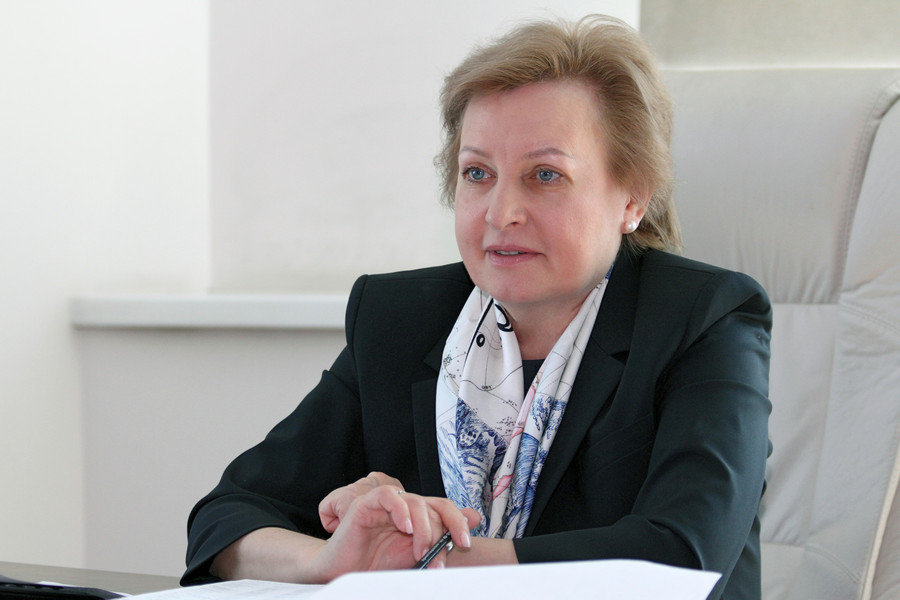Elena BAKHMUTOVA, chairperson of the Council of the Association of Financiers of Kazakhstan:
KAZAKHSTAN HAS SEEN RETAIL INVESTORS' GROWTH FOR THE FIRST TIME IN MANY YEARS

Despite the ongoing pandemic 2021 has turned out to be better for Kazakhstan than analysts expected. Digitalization in the field of public and financial services has significantly increased inclusiveness in the financial market. There has been an increase in retail investors as well as non-cash payments. Their pension assets have become accessible to Kazakhstani citizens.
The fight against climate change and the implementation of the principles of environmental, social, and governance (ESG) criteria have become not just words, but a new reality. However, high inflation, a need for fiscal consolidation, higher budget revenues, non-oil deficit reduction, spending optimization and scaling down large-scale government programs will remain challenges for the country's economy in 2022.
Elena BAKHMUTOVA, chairperson of the Council of the Association of Financiers of Kazakhstan, told Interfax-Kazakhstan how the year had passed and what the country's economy would face in 2022.
- Elena Leonidovna, how has the pandemic affected Kazakhstan's financial market in 2021?
- If to talk about the banking sector, the main indicators are quite encouraging. Available data for the first 10 months of 2021 can be used to assess the entire year. Thus, the total assets of the country's commercial banks grew 15.5%, and the loan portfolio up 16.1%. If to talk about the quality of assets, then a positive trend is observed . The share of NPL90 + significantly decreased and now it amounts to 4.1% of the total loan portfolio, while loans with signs of depreciation do not exceed 10%. There is also an increase in equity capital in the banking sector, which amounted to 13.1% in 10 months of 2021. I think that the rates will remain approximately the same on an annualized basis. Net income exceeded 1 trillion tenge in the banking sector.
It can be stated that the pandemic and periodic lockdowns have so far had a less negative impact than most analysts expected. First of all, thanks to the unprecedented measures taken by the state to support business. Delays in payments and restructuring of loans offered by banks provided tangible support for business and individuals.
The insurance sector shows the same positive dynamics. Assets grew 17.5%, insurance premiums - more than 21%, equity capital increased 23.8%.
Good results can be noted in the development of the securities market, as the share market capitalization increased straight away 72.3%, and the government securities volume increased 8.4%.
This year GDP growth has already reached 3.8%, according to preliminary government estimates.
However, another "black swan" has recently emerged in the form of the new Omicron [Covid-19 ] strain , which has already caused a series of restrictions in Europe. But this is rather next year's challenge, especially since the situation with the incidence in Kazakhstan is stable for the time being.
- Due to the pandemic many companies have gone online, sent employees to work remotely, has the financial sector changed in this regard this year?
- The year has turned out to be better than expected. The low start in 2020 made it possible to achieve significant growth rates in most sectors of the economy with a tangible increase in real household incomes.
New products have been actively introduced in the financial market, non-cash payments and channels for their provision grew, opportunities for remote customer service expanded, access to certain government services increased thanks to integration into government databases through banking apps. This move has involved both legal entities and individuals.
Digitalization in the field of public and financial services has significantly increased inclusiveness in the financial market. For the first time in many years, the growth of retail investors in the securities market has been noted, amounting to 47%. This year the preconditions for the expansion of online services for types of voluntary insurance and opportunities for the future online settlement of insurance payments for certain types of compulsory insurance have been created. Such a breakthrough in the growth of accessibility of financial services through remote channels has become possible due to liberalization of legislation, as well as due to innovations introduced into the business processes of the financial organizations themselves.
In 2021 some banks have left the market resulting in further consolidation of the banking sector, which is still represented exclusively by private players, except for state development institutions. Due to the high level of innovation inherent in the leading players in Kazakhstan's financial market and healthy competitive environment, customers have got access to a wide range of financial services and a service level that is not inferior to the standards of developed countries.
- What token events that have had an impact on the country's economy in 2021 would you highlight?
- I would single out several token areas that create a trend for the future.
First, the growth of retail investors. This expands the investor base, contributes to the growth of liquidity in the securities market and emergence of new issuers, has a positive impact on the growth of household financial awareness.
Second, the growth of non-cash payments. These are new technologies, reduction of business costs in the medium term, shadow economy decrease and tax evasion, population financial literacy enhancement and digitalization of processes in the activities of small and micro businesses.
Third, the transfer of pension assets to private management in excess of a sufficiency threshold and the expansion of opportunities for concluding pension annuities. This gives a boost to the stock market by expanding investment opportunities for life insurance companies. In addition, this creates incentives for raising individuals' awareness, who transferred their savings to private management, of the rules of the stock market, prospects for some of these investors to move into the segment of qualified investors.
Fourth, new climate change initiatives and ESG principles that will have a direct impact in the future not only on the development of the economy as a whole, but also directly on the activities of the financial sector and its services.
Fifth, the emergence of a new budget rule, which will take effect from 2023. It envisages balancing public finances and a cautious attitude towards the use of the National Fund. Several restrictions must be observed: foreign exchange assets of the National Fund must not be withdrawn when a 30% GDP threshold is reached, transfers from the National Fund to the budget must not exceed annual receipts calculated on the basis of a given oil price (cut-off price). This new rule will improve the budget spending discipline. It envisages the need to increase the revenue side of the budget, as well as efficient and cautious planning the expenditure side of the budget, including optimization of government programs.
- You said that this year you see a record increase in the stock market capitalization . What is this related to?
- This is due to the stock market activity, as well as due to the fact that foreign shares are traded on the KASE. If, in general, to talk about the rising activity on the securities market, then it is worth noting the increased role of the Finance Ministry in the formation of the yield curve through the issuance of government securities from 2 to 5 years in the segment that is demand. Previously, the yield curve was only up to one year and was formed on the basis of the yield on the National Bank's notes.
It is expected that next year issuers of corporate bonds will be more active in the market, while issuers from among SMEs can count on interest rate partial subsidies at the expense of the budget within the framework of state programs.
- Do you have information about Kazakh companies, who are going to make an IPO amid the rising number of retail investors?
- Unfortunately, IPOs for the major national companies are delayed to some extent. But recently the deadlines for 2022-2023 were re-announced. I hope they will be observed. IPOs should take place simultaneously on two Kazakhstani platforms in order to provide wide access for domestic retail investors.
In addition, the market expects IPOs from other private companies. For example, the retail chain Magnum Cash & Carry is considering such a business opportunity, as its CEO stated . However, this option yet needs to be thoroughly evaluated.
- What measures should the National Bank and the government take to stem inflation? How do you assess what has already been done?
- According to the National Bank's estimates, by the end of 2022 it will not exceed 6-6.5%. Thereafter the goal will be the same, that is, 4-6% to slow down to 3-5% within the following 5 years. The joint action plan of the National Bank, the government and local executive bodies was adopted. It worked in terms of reducing inflation in November from 8.9% to 8.7%. By the end of the year, there are forecasts for its decrease to an average annualized value of 8.5%.
Kazakhstan is an open economy. Food prices increased 40% worldwide, inflation in the United States reached its 30-year high - 6.4%, in Russia it reached 5-year high or 8.1%. The share of Russia in goods imports exceeded 41%. Objectively, there is an inflation effect in importing countries on inflation indicators in Kazakhstan.
It should be remembered that fiscal stimulus was quite high in 2019 and 2020 due to the pandemic, this caused inflation not only in our country, but worldwide. The response to the pandemic has stimulated money emission, which has driven prices up. Another objective factor that triggered inflation growth is that during the pandemic, supply chains were disrupted, there were disruptions in production and supply of raw materials and consumables.
It takes time to restore production, logistics, and to absorb excess liquidity, which is pressing the economy. It is critically important for Kazakhstan that fiscal and monetary actions be coordinated. When the National Bank raises base rates and tightens the monetary policy, the actions of the government and local authorities must not create massive fiscal stimulus in the form of increased spending and concessional lending.
- Do you think it will be possible to reduce inflation to 6-6.5% by the end of 2022?
- I believe that this could be achieved, if we exclude force majeure in the form of large external shocks. The situation in the world is unstable, sanctions rhetoric and the threat of military conflicts are increasing. There are lockdowns in Europe again. These events will certainly have a negative impact.
- Are any changes expected in the banking sector in 2022?
- The market has been sufficiently cleared of weak players. Most banks that underwent asset quality reviews (AQR) in 2019 are now in the process of implementing a corrective action plan for vulnerabilities identified during AQRs.
The last exit of banks from the market has born a market nature, there has been no bail-out by the state, shareholders and major investors themselves have lost money.
As for the backbone banks, with regard to them supervision is tighter and the threat of such exits of the backbone banks is clearly not on the agenda.
I would like to note that in the past year the rating agencies have raised ratings for 6 banks, and they confirmed them at the current level for the others. This is external confirmation that the banks have withstood the pandemic hit and had sufficient capital and liquidity reserves.
- What should the financial market to expect in 2022? Will there be any change, new players?
- If there will be no external shocks, the prospects for 2022 for the Kazakh economy are favorable. It is worth noting inflation, the need for fiscal consolidation, increase in budget revenues, deficit reduction (primarily non-oil deficit), cost optimization, scaling down large-scale state programs that were significantly expanded during the pandemic among the challenges.
If to talk about the financial market, then this is the development of the securities market. The securities market infrastructure development will continue, including towards achieving synergy between AIFC and the domestic financial market.
I think that next year's another trend will be timeline determination for the digital tenge launch. Also in 2022, the National Bank's initiatives in the field of the national payment system will become a reality, this is an instant payment system and an interbank payment card system.
It is also necessary to seriously get prepared that ESG principles will become not just a fashion trend, but a reality. Kazakhstan has big challenges on this matter, because the economy depends to a large extent on non-renewable energy sources, especially on sources of pollution such as coal. It is clear that it is impossible to give up coal immediately; this requires huge investments and behavior change.
All this requires serious, large-scale changes and it is necessary to start right from next year. It is required to conceive the role and place of Kazakhstan in the new division of labor, when the world will move to a new format, completely digital with artificial intelligence, with alternative renewable energy sources. It is necessary that Kazakhstan and, first of all, its labor resources, its scientific human resources meet such challenges. Repeatedly the need emerges for cautious spending assets accumulated in the National Fund and adopting future budget liabilities.
- What will be the tenge exchange rates in 2022?
- The tenge rates are a derivative of everything that I already said. The situation with the balance of payments is improving thanks to increasing exports. According to the National Bank, in the future there may be opportunity for achieving the positive current account balance. The better the state of the balance of payments and its current account are, less pressure will be exerted on the tenge.
However, there are also external processes. If the US Federal Reserve raises rates, then this will already be indirect pressure on the tenge. The dollar index is rising - also a negative for emerging markets, to which Kazakhstan belongs. The fact that a significant number of foreign investors are present in the domestic government securities market helps with the foreign currency inflow, which contributes to the strengthening of the tenge. However, large-scale withdrawals [could] lead to an increase in volatility in the foreign exchange market. There are also a number of external factors: sanctions against Russia, military rhetoric, oil price volatility, etc. All this has an impact on exchange rates. Since the National Bank adheres to the inflation targeting principle and freely floating exchange rates, the exchange tenge rates depend on many factors and are formed depending on supply and demand in the forex market.
To restrict its foreign exchange risks, business must learn to use hedging tools that gradually emerge in the market.
- Thank you for the interview!
December, 2021
© 2025 Interfax-Kazakhstan news agency
Copying and use of these materials without reference to the source is prohibited
Archive






